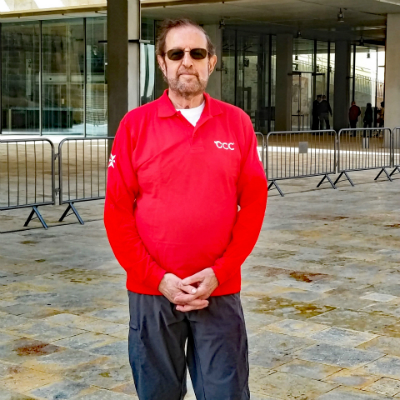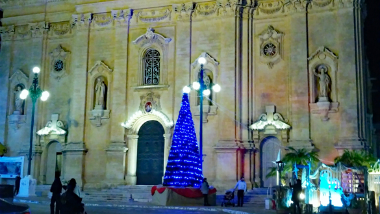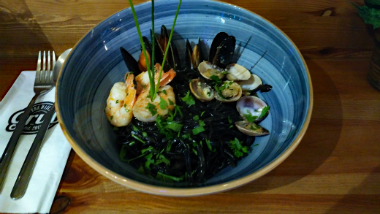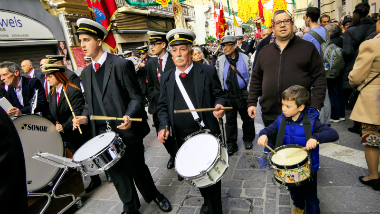
Alan Zelt '64
Malta
Alan Zelt never lived abroad, but he and his wife have chosen to retire to Malta, an island country that lies below Sicily in the Mediterranean Sea.
Born and raised in Plainfield, New Jersey, Alan Zelt ’64 came to Moravian to study history. When he wasn’t in class or bent over a text or research paper, he immersed himself in the brand-new campus radio station, WRMC, starting as a DJ and later becoming the sports director. Upon graduation, he didn’t have a clue what he wanted to do, so he headed for the Jersey shore and got a job as a bartender. That was followed by six years in the navy working in intelligence and then a 40-year career in business.
“I was in sales and marketing, mostly for start-up technology firms,” says Zelt. “As vice president of sales and later president, I traveled the US, the Caribbean, and Europe, while making my home in Seattle.” During those years, Zelt also met and eventually married writer A.K. Lakelett, the author of British police detective novels whose book Remember Me? achieved best-seller status in Australia and Canada.
Together, they made the decision to move to Europe. “There were many factors involved—quality of life, medical care, cost of living—not to mention it would be a tremendous educational experience for us,” says Zelt. They considered the United Kingdom, but with the uncertainty over Brexit, they turned their attention to Finland, where Lakelett has citizenship. The cold and the challenge of learning Finnish shriveled that possibility. “And then came Malta,” says Zelt. “Who would have thought that little spec of land [about 30 percent greater in area than Seattle with roughly 30 percent fewer people] could tick all the boxes?”
“Western Europeans have asked me to tell my fellow Americans to stop calling them socialists. Except for the Swedes, they are all out-and-out capitalists. They compete hard. Making employee rights a priority does not make them socialist.”
Except one. It turned out that Maltese is one of the hardest-to-learn languages in western Europe. It developed from an Arabic dialect but includes elements of Italian and Spanish. Fortunately for Zelt and Lakelett, Malta also recognizes English as an official language. “I will keep plugging away at learning Maltese, though,” says Zelt, “because it is important to the Maltese.”
Zelt and his wife own a home in Malta and are enjoying their life there, especially the people. “The vast majority of western Europeans are very friendly and open when they realize you genuinely care about them, and they will assist you in any way they can,” says Zelt. Then, of course, there’s the history—Maltese civilization is 5,000 years old; there’s a lot to learn. “I was a history major,” Zelt reiterates. “I want to continue to learn: Why is the Church so important to Malta? How does politics work or not work here? What drives the Maltese?”
MALTA BY ZELT
My favorite breakfast spot is the terrace of our penthouse. From it, I can see the Mediterranean Sea, churches, and other historic buildings and listen to the absolute quiet. And I make a mean breakfast with homemade bread. For your information, the motto of the village of Naxxar (our home) is Prior Credidi, meaning “first to believe.” Some say the Maltese are among the earliest Christians, having rescued Saint Paul when his ship to Rome was capsized. So there’s a lot to see from our terrace.
Read more about people, places, and life in Malta on Alan Zelt’s blog at maltabyzelt.home.blog.
Zelt is also enjoying his firsthand education in Malta’s modern civilization and values the opportunity to juxtapose American and European cultures. “Western Europe is best understood by comparing it with the United States and exploring and understanding the thinking of the people who live there,” he says. He notes that taxes are higher than in the United States but appreciates that people receive essential services, including healthcare (Malta’s ranks fifth in the world), pensions, and free education. “Tucked into this year’s national budget was a benefit for me!” enthuses Zelt. “Effective this past January, all senior bus passes (for residents over 75) are free.”
For now, Zelt and his wife plan to live out the rest of their years in Malta, he learning and she writing, but he will certainly miss his homeland, especially the people. “As I traveled the United States for work, I learned quite a bit about my fellow Americans,” he says. “In the South, I learned about all the different kinds of barbecue, customs, and life specific to each region. While I might not have appreciated the politics of some areas, the people were all genuine. In the South, a contract was a handshake. In the Northeast, business, contracts, and life were always discussed over dinner. I will miss all those people. They cared about me, and I genuinely admired all of them.”

The parish church in the village of Naxxar

Tagliatelle with squid ink and shell fish at a local restaurant

A Maltese band club plays during festa
